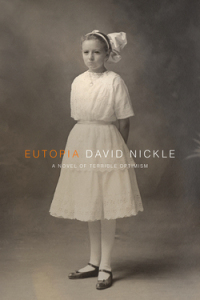Those Across the River by Christopher Buehlman
 Thursday, August 11, 2011 at 1:40PM
Thursday, August 11, 2011 at 1:40PM 
Published by Ace on September 6, 2011
With only light foreshadowing of the horror to come, the first 40 percent of Those Across the River is devoted to atmosphere. Frank Nichols is a former history professor and recent transplant to depression-era Georgia, having moved into a house bequeathed to him by his aunt. Frank left Ann Arbor with Eudora Chambers, with whom he had been having an affair. Dora had been married to a faculty member who had enough influence to prevent Frank from finding employment at another university; hence the move to a house Frank's aunt had warned him not to inhabit. Frank decides to spend his time in Georgia writing a book about his great-grandfather Savoyard, a cruel and bigoted plantation owner who not only abused his slaves but refused to emancipate them after the Civil War ended.
As Frank settles into languorous rural life in the small town of Whitmore, passing time on the porch of the general store or conversing with hard-drinking Martin Cranmer (the only local resident who possesses even a smidgen of intellectual curiosity), he comes to learn that the locals avoid the nearby woods where the Savoyard plantation could once be found. The woods figure prominently in the town's annual social event -- the pig chase -- which inevitably culminates in the disappearance of pigs into the woods, never to be seen again. Frank's nightmares about his service in the Great War are supplanted by more immediate fears when, strolling through the woods in search of the Savoyard plantation's remains, he comes across a mute, half naked boy who may be nothing more than a phantom. After a neighbor's son is taken into the woods and ravaged -- a crime that prompts the lynching of a large black man found picking berries in the woods -- the novel begins to shift into horror mode.
The next 40 percent is ordinary horror fare: shape-shifting, once human creatures with supernatural abilities; silver bullets; frightened and ineffectual villagers. Well written though it is, this part of the story didn't grab me. Whether the creatures and their susceptibility to silver is viewed as traditional or unimaginative is open to debate, but it seemed too familiar to be frightening.
The final 20 percent ties the first two parts together in a way that redeems the novel. It is creative, intense, surprising -- and yes, at least one scene is genuinely scary. I like the story's open-ended conclusion, its effective use of the horror convention that more terror may be lurking beyond the final pages.
Although I wouldn't describe Christopher Buehlman's prose style as poetic, his background as a poet is reflected in his careful word choice and in the fluidity of his sentences. He assembled this novel with craftsman-like storytelling ability. I'd love to see him turn his talent to meatier subjects. In any event, while I'm far from a devoted fan of the horror genre, this novel tells a well-paced story that transfixed me in the last chapters.
RECOMMENDED

